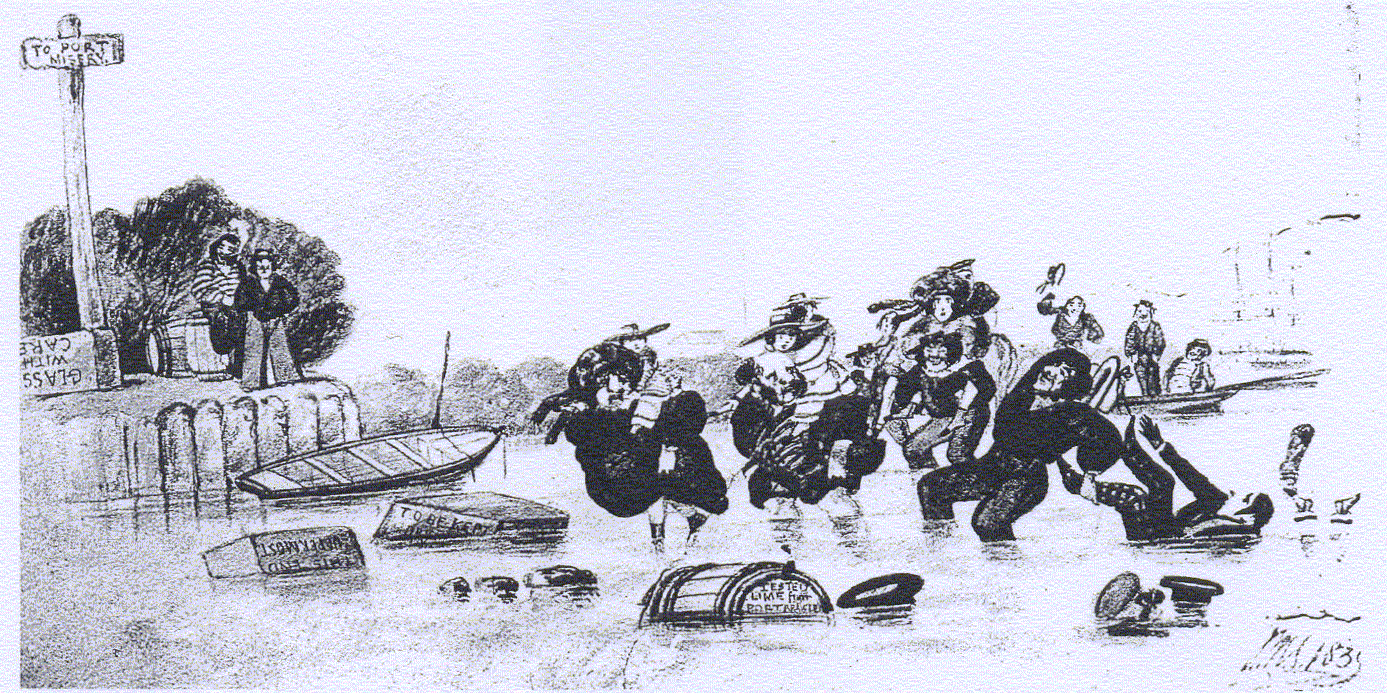The PESTONJEE BOMANJEE 1838
|
|
It was interesting to note that the only passengers of the Pestonjee Bomanjee known to be still alive in 1896 were Mr Thomas Ayliffe [son of George Ayliffe, also a passenger on the Pestonjee Bomanjee], Mrs Elizabeth Ayliffe, Mrs Bevis (1796-1898) - see her story on the right, Elizabeth Burford [now Mrs R K Finlayson], B H A Cawley, E S Edwards, J F Field, Joseph Fisher, Mrs Sarah Gant, of Tarlee, came to SA with her parents and eight brothers and sisters James C Hawker - wrote a very interesting Diary, Hannah Holbrook was born in Derbyshire in 1819, and married from Government House in 1840 to Mr Thomas Newman Turner at Trinity Church, Adelaide. She and her two sisters Elizabeth and Harriet came together to SA. W Lapstone, Roderick McKenzie was still alive in 1896, though his health was failing fast. He died May 30th, 1898] He remembered carrying Governor Gawler's daughter on his back to shore. [Click picture to see bigger image]  Mrs Tom Penny of Marrabel Mrs Emma Plush [possibly nee Radford], W Percival Edwin and Herman Radford, Charles, John and David Radford Mrs Thomas Sage [possibly nee Radford] William Reid, a native from Glasgow, came to Sa with his father and siblings. In 1851 William went to the Golden Point diggings at Ballarat and Eaglehawk, where he had fair luck. He was manager of 'Yanco' station, in the Riverina for five years till 1860. He saw many a good or a bad time in this colony, unfortunately too much of the latter. |
 Amongst the 230 passengers was Mrs Margaret BEVIS nee Mann (1796-1898). On July 31, 1896 she celebrated the centenary of her birth in Oldborough, Suffolk in England. She was 30 when she married in 1826 to John Bevis (a master builder) at Fraham, Suffolk. Her refined face and clear cut profile bear testimony that she must have been handsome in her younger days. She has led an active useful life, and seen many changes in her time, and, although her sight failed sometime age, is still mentally alert and clear of comprehension. She reminsenced "we came to the Colony on October 12th, 1838 on the PestonjeeBomanjee, commanded by Captain Hill, with Governor Gawler and his suite. I remember his public swaering in on the 17th [October] - nothing like the great affairs you have now, for Adelaide then was a village in the scrub. I remember that we sailed from Blackwall on King Charle's Day [Oakapple Day] and were five months coming out - a long tedious voyage, but ships in those days often took longer than that to get to the Antipodes. We stopped at Rio de Janiero and landed there. Yes, I remember Colonel Light, a little dark very active clever man, who laid out Adelaide, and was always in hot water with Colonel Gawler. He died in October 1839 I think, and they said his heart was broken on account of the way they worried him about the site of the city. His public funeral was one of the saddest and most memerable affairs of that year. [Comment: some reports say it was the disastrous fire that consumed every vestige Light had of his charts and instruments, his life work, lost in toto. Both Mr Light and Mr J H Fisher's houses, built with reed, were reduced to ashes within an hour. Mr Light was taken away almost frantic, and Mr Fisher swooned and was taken away in a sedan chair.] Oh I could not tell you one-tenth of the things that took place in those days. We were too busy to bother with anybody's business but our own. I accompanied my husband to the diggings at Bendigo and Sandhurst, and recollect well gallent Captain Tolmer with his brave escort - he was a splendid rider, and did not know what fear was - a thorough soldier. The newspaper report went on to describe the aged pioneer, whose memory was better for events which occurred nearly half a century ago than for those of much more recent date. Born in the reign of George III, she was in England when George IV came to the throne and reigned and died, and also when William IV was crowned and went the way of all kings, and she did not leave the old country until after Queen Victoria had ascended the throne. Her life no doubt in that quiet Suffolk village, was uneventful enough, but they were stirring times then. Pitt was Prime Minister, England was threatened with invasion, Nelson won the Battle of Trafalgar. She was a strong lively young woman of nineteen when all England and the Continent were ringing with the news of the Duke of Wellington's great victory at Waterloo, which crushed the power of Napoleon. She knew the first railway lines in the world were opened between Liverpool and Manchester, when cholera ravaged the land, and Wilberforce succeeded in his noble efforts for the abolition of slavery, and many other events, agitations and concerns which occurred during this old colonist's lifetime. Margaret Bevis died on July 22, 1898 in North Adelaide. |
